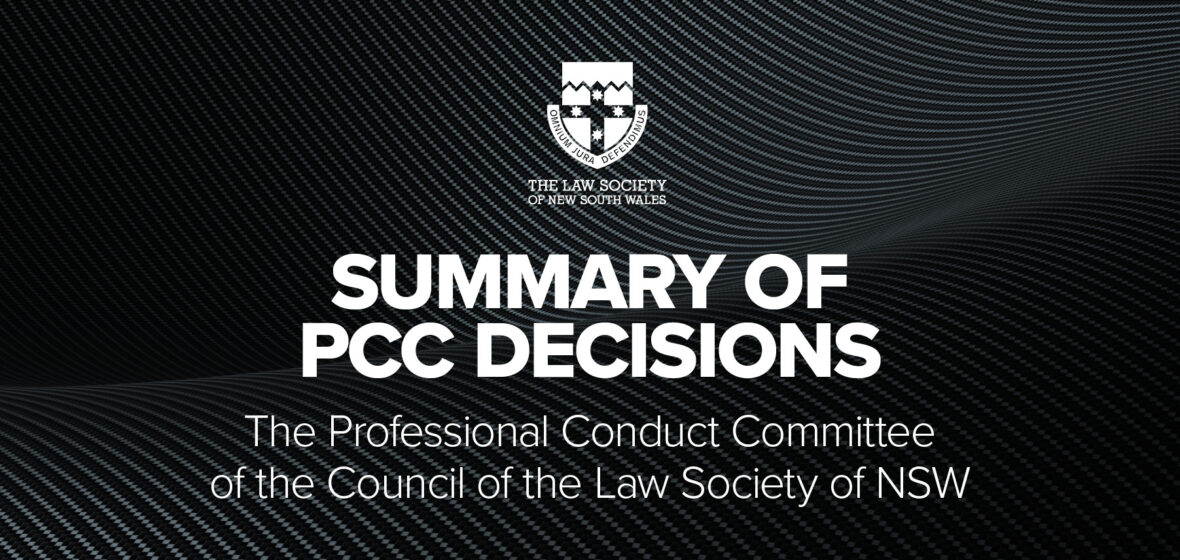The Professional Conduct Committee (PCC) of the Council of the Law Society of NSW (Council), under delegation from the NSW Legal Services Commissioner and the Council, deals with complaints referred to the Council by the NSW Legal Services Commissioner.
There were 8 matters determined this quarter, which involved the following conduct issues:
- failure to provide sufficient information so as to allow a client to make an informed decision regarding payment of an executor’s commission;
- conflicts of interest regarding payment of an executor’s commission;
- failing to correct a false statement and making allegations without a reasonable basis;
- breaching Rule 25 of the Legal Profession Uniform Law Australian Solicitors’ Conduct Rules 2015 (Conduct Rules) by conferring with two lay witnesses at the same time; and
- engaging in conduct that fell short of the standard of competence and diligence expected of a solicitor.
Failure to provide sufficient information regarding executor’s commission
One of the matters considered by the PCC this quarter, concerned a solicitor who was appointed executor for two separate estates. The complaint concerned whether the solicitor had provided sufficient information to the beneficiaries of the estates concerning the calculation of the executor’s commission.
The allegation was that the solicitor failed to inform the beneficiaries of the legal basis on which he was making a claim for executor’s commission, the particulars of the work performed, the entitlement of the beneficiaries to have the Supreme Court assess the solicitor’s commission and that the beneficiaries should seek independent legal advice.
Section 86 of the Probate and Administration Act 1898 provides that the Court may allow out of the assets of the estate to the executor (administrator or trustee), in passing the accounts relating to the estate, such commission or percentage for the executor’s pains and troubles as is just and reasonable.
The general rule is that if an executor does not file their accounts, as laid down by the law, the court will not grant commission except in exceptional circumstances (In the Will of Bye (1933) 50 WN (NSW) 226).
An executor has no entitlement to commission as one of the duties of the executor is to act gratuitously and not profit from their position (Finlay v Tucker [2015] NSWSC 560 at [111]-[113]). It is not permissible for an executor to proceed on the basis that because the Court can lawfully give commission, and generally gives it when executors have behaved well, executors can safely take it themselves, and judge for themselves whether they have behaved well (Crout v Beissel [1909] VLR 207 at 213).
In the alternative to making an application in accordance with section 86, an executor can be remunerated if the will includes a remuneration amount or a rate of commission or indicates an entitlement to commission or there is unanimous agreement between the beneficiaries of the estate and the trustees.
In the complaint it was alleged that the solicitor had not obtained unanimous agreement, that the wills did not establish a rate of commission and the solicitor had not made an application in accordance with section 86.
The PCC found that the solicitor had engaged in unsatisfactory professional conduct by failing to properly inform the beneficiaries of their rights in respect of the payment of commission and by taking commission without making a section 86 application (and without consent or the will providing for it). The solicitor was reprimanded and required to undertake and complete an education course in the area of Wills and Probate.
Correcting false statements/ Statements without a reasonable basis
Two matters considered by the PCC this quarter related to Rules 21.2 and 22.2 of the Conduct Rules.
Rule 21.2 provides that a solicitor must take care to ensure that decisions by the solicitor to make allegations or suggestions under privilege against any person:
“21.2.1 are reasonably justified by the material then available to the solicitor,
21.2.2 are appropriate for the robust advancement of the client’s case on its merits, and
21.2.3 are not made principally in order to harass or embarrass a person.”
Rule 22.2 provides that a solicitor must take all necessary steps to correct any false statement made by the solicitor, to an opponent, as soon as possible after the solicitor becomes aware that the statement was false.
In one matter, a solicitor made a representation to an opponent in correspondence, about another solicitor, which turned out to be false. Although the solicitor named in the correspondence, wrote to the solicitor who prepared the letter to advise that the statement was false, the solicitor (who made the false statement) did not respond nor did the solicitor contact the opponent to correct the false statement.
Rule 22.2 imposes a positive obligation on a solicitor to take action, to rectify a false statement, as soon as possible after becoming aware that the statement is false. It is not enough that an opponent may be aware of the solicitor’s mistake by other means, it is the solicitor’s responsibility to actively rectify the false statement.
The PCC also found that the solicitor breached Rule 21.2, by not providing a response to the correspondence advising the solicitor that the statement in the correspondence was incorrect. As a result, the PCC made a finding of unsatisfactory professional conduct and the solicitor was ordered to provide an apology.
In another matter considered by the PCC, which concerned Rule 21.2 (and rule 34) of the Conduct Rules, a solicitor issued a letter which contained an allegation about one of the opponent’s legal representatives. The allegation was based on instructions provided by the solicitor’s client. The PCC found that the solicitor should have been prudent and made further enquiries before the letter was issued, particularly as the allegation was of a personal nature. The PCC also noted that solicitors are not merely clients’ “mouthpieces”. The PCC found that there was a breach of Rule 21.2 as there appeared to be no intrinsic value to making the allegation in the overall progression of the matter and as the allegation was of a personal nature, may have also been said with the intent to embarrass, in breach of Rule 34 of the Conduct Rules. The PCC made a finding of unsatisfactory professional conduct and the solicitor was reprimanded.
It appears that solicitors need to tread a fine line between advancing the merits of their client’s position and taking care not to make statements without a reasonable basis and which may embarrass and/or be false.
Breach of Rule 25 of the Conduct Rules
In one of the matters this quarter the PCC considered the application of Rule 25 of the Conduct Rules.
Rule 25 states that a solicitor must not confer with or condone another solicitor conferring with more than one lay witness at the same time. Subsection 2 of Rule 25 provides that a solicitor will not have breached Rule 25.1 by conferring with or condoning conferral with more than one client about undertakings to court, admissions or concessions of fact.
In the complaint before the PCC, it was alleged that the solicitor had met on two occasions with the lay witnesses at the same time. It was alleged that during the conferences the solicitor discussed with the two lay witnesses matters that would be contentious in the matter and which they would be providing evidence concerning.
As noted by Sheller JA in Day v Perisher Blue Pty Ltd [2005] NSWCA 110 at [30]:
It has long been regarded as proper practice for legal practitioners to take proofs of evidence from lay witnesses separately and to encourage such witnesses not to discuss their evidence with others and particularly not with other witnesses.
Further, as the Legal Practice Tribunal stated in Legal Services Commissioner v Hansen [2008] LPT 7 when considering Rule 47 of the Legal Profession Board (Barristers) Rules 2004 QLD:
The purpose of the Rule is apparent from the heading which is to be read as part of the Rule (although not to read it down). That purpose is to preserve the integrity of evidence. The vice sought to be avoided is a situation where two or more witnesses, by being together with the barrister in conference, conferring about contentious issues in the proceedings, are encouraged to modify, or be at risk of modifying, or changing, the evidence that they might give.
The PCC found that there was no evidence that the solicitor independently verified the evidence of the witnesses absent the presence of the other witness. Nor did the PCC accept the solicitor’s submissions, seeking to rely on Rule 25.2. Therefore, the PCC found that the solicitor had engaged in unsatisfactory professional conduct and resolved that the solicitor be reprimanded and undertake ethics training.




